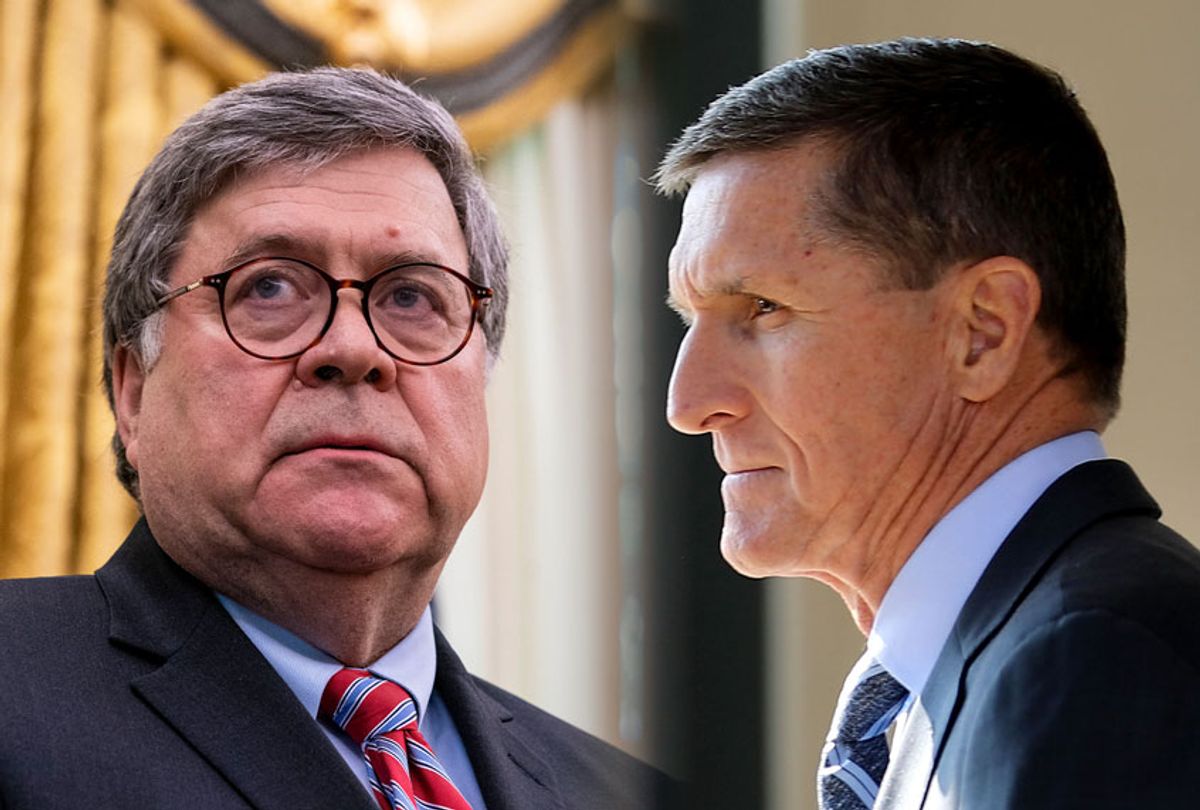Acting solicitor general Jeff Wall told a panel of federal judges that Attorney General William Barr had secret reasons for asking a judge to dismiss criminal charges against President Donald Trump's first national security adviser Michael Flynn.
Wall, the government's top Supreme Court lawyer, made the stunning claim during a Tuesday hearing on the Flynn case in front of the full D.C. Circuit Court of Appeals.
"Under the circumstances, we went further than we thought we were obligated to," Wall told Judge Merrick Garland. "To drive that point home, the attorney general sees this in the context of public information from other cases."
"It may be possible the attorney general had before him information that he was not able to share with the court, and so what we put in front of the court were the reasons that we could," Wall continued. "But it may not be the whole picture available to the executive branch."
"We gave three reasons: One of them was that the interests of justice were no longer served by the prosecution," he said. "The attorney general made that judgment on the basis of lots of information. Some of it is public — and some is not."
The legal issue at hand is whether the Department of Justice can force presiding U.S. District Judge Emmet Sullivan to dismiss the Flynn case without a full review of Barr's abrupt decision to drop charges.
Flynn pleaded guilty on two occasions to lying to the FBI about his contacts with former Russian ambassador Sergei Kislyak ahead of Trump's inauguration. He was about to be sentenced when he withdrew his plea. While Flynn's withdrawal was unusual, Barr's intervention was more so, sending shockwaves through the legal world and prompting nearly 1,200 former Justice Department prosecutors and officials to sign a petition encouraging Sullivan to hear the case out.
Wall told the appeals court that the administration had concerns about Sullivan looking into Barr's role in the decision, saying the attorney general based his call in part on non-public information — which he desired to keep private. Wall did not further specify the nature of that information.
"I don't know that the additional reason for dismissal is necessarily nefarious," former U.S. attorney Barbara McQuade told Salon.
But while the motion to dismiss might be derived in part on classified information, such information could still be provided to the court under seal or in chambers.
"It did surprise me only because DOJ filed a lengthy brief explaining the reason and did not make this disclosure. But it is hard to know the reason," McQuade added. "It could be that [U.S. District Attorney] John Durham is investigating misconduct relating to the Flynn investigation, and he cannot publicly disclose it at this point. Or it could be that there was some classified reason, such as the method by which the Flynn calls with Kislyak were intercepted."
Though judges defer to prosecutors to make charging decisions for a number of reasons, McQuade said Wall's statement "sounds more like a specific fact that can't be shared."
"Just because it is not public does not mean that it is necessarily part of a cover-up of some sort," she said, suggesting one possibility could be a pending investigation that may or may not result in charges, specifically the sweeping probe of the Russia investigation which Barr commissioned to Durham after former special counsel Robert Mueller's office concluded its work.
As for the current Flynn hearing, experts have laid out essentially three possibilities. The judges might side with the Justice Department and dismiss the case outright, or they could kick the case back to Sullivan's courtroom given that Flynn could still appeal his decision through other channels. Finally, the court might reassign the matter to a different judge should it decide that Sullivan can no longer rule on the contentious case with impartiality.
Though those questions are narrow, the outcome has become about much more than Flynn. Trump and his allies, Barr included, have commandeered the case as a vehicle to counterattack alleged "deep state" officials over accusations that federal agents acted improperly when they investigated counterintelligence threats in 2016. Durham's ongoing probe is one arm of this effort.
Further, Flynn's guilty pleas play a central role in the "QAnon" conspiracy theory, which casts the former three-star general — who served under former President Barack Obama — as a martyr, persecuted for his inside knowledge of the previous administration's alleged efforts to undermine Trump.
Barr, for his part, told CBS News in May that "people sometimes plead to things that turn out not to be crimes."



Shares